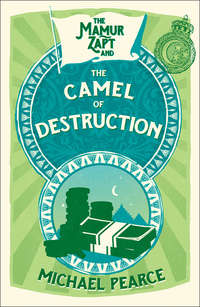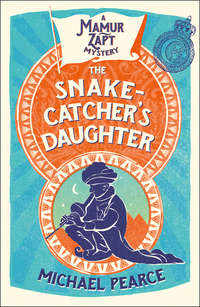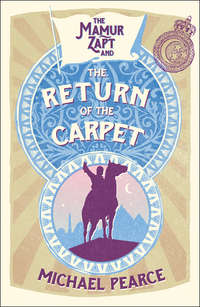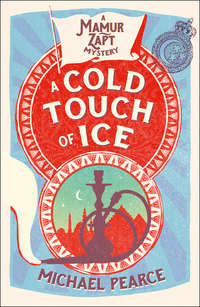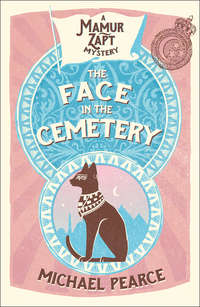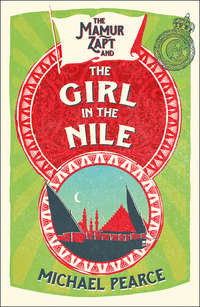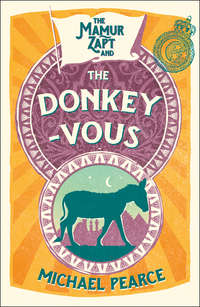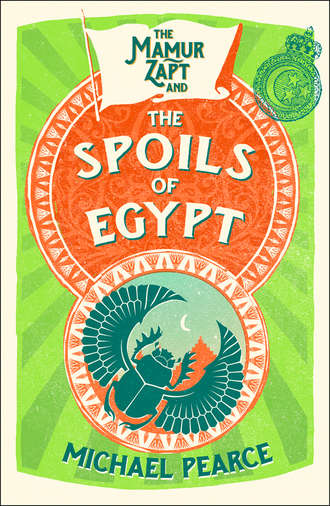
Полная версия
The Mamur Zapt and the Spoils of Egypt
Across the room Zeinab and Miss Skinner were bringing their conversation to an end.
‘Surely there is something you can do, mon cher?’ said Nuri earnestly to Paul. ‘Persuade her to take up other interests, perhaps?’
‘Well, there is the Women Question—’
‘Ah yes,’ said Nuri thoughtfully.
‘But more immediately,’ said Paul, ‘there are her archæological interests. I am taking her down to Der el Bahari at the end of this week.’
‘Are you? Are you, indeed?’
The conversation ended and the women rose together.
‘You do see now, don’t you, Pasha,’ said Paul quietly, ‘the importance of these political questions?’
‘Oh, quite,’ said Nuri. ‘Oh, quite.’
‘It would be very unfortunate if Miss Skinner were to get the wrong impression.’
‘Don’t worry,’ said Nuri Pasha. ‘I know exactly how to handle Miss Skinner.’
Owen stuck his head into the bar room.
‘Trevelyan here?’
‘No,’ said someone. ‘He left this morning. He’s on his way to Der el Bahari by now.’
‘With our blessings,’ said someone else.
‘There’s a lot of money riding on it,’ said Carmichael, from Customs.
‘Why’s that?’ asked Owen, coming definitely into the room.
‘It’s that damned woman,’ said someone, Jopling, from Finance. ‘We’ve promised him free drinks for a month if he can keep her down there for a fortnight.’
‘More if he can do it for longer.’
‘It’s the end of the year,’ someone explained, ‘the financial year, that is. We’re up to our eyeballs in work reconciling everything in sight. And then this damned woman comes along, poking her nose in.’
‘I don’t mind her poking her nose in,’ said Jopling. ‘It’s having to take time off to answer her silly questions.’
‘If she’d just read the Accounts,’ said someone else, obviously also from Finance, ‘that would be fine. But she wants to go behind them, keeps asking what they mean.’
‘As if they meant anything, other than just an end-of-year story to keep everybody happy.’
‘So we promised Trevelyan he could have free drinks every evening if he’d only get her out of our hair.’
‘It’s worth it.’
‘It certainly is,’ said Owen. ‘I’d have cut myself in if I’d known. Wahid whisky-soda, min fadlak.’
He collected the whisky-soda and sat down in a corner with Jopling and Carmichael.
‘Has she been getting in your hair, too?’ asked Carmichael.
‘My God, Owen,’ said Jopling, ‘if she’s been looking at your finances—!’
‘Thank you, not yet. She’s concentrating on the whitewash boys rather than the workers. It’s the antiques export business,’ he said to Carmichael.
‘That? The export licence stuff?’
‘She can forget that,’ said Jopling. ‘The Treasury people back in Town are all Free-Traders. Now that the Liberals are back in power. They won’t hear of a licence.’
‘I don’t know where she stands on the licence business,’ said Owen. ‘From what I’ve gathered, it’s more a question of whether to allow antiques to be exported at all.’
‘She wants to ban that? Bloody hell, that would create a rumpus.’
‘It would. It is already.’
Jopling regarded him curiously.
‘How do you come to be involved? It’s not really your line, is it?’ Like many people, he was uncertain exactly what was the Mamur Zapt’s line. ‘More Carmichael’s.’
‘Enforcement,’ said Carmichael. ‘He’s on the enforcement side.’
‘Stopping the smuggling? Blimey, you’ve got a job on! Good luck, mate!’
He drained his glass. Carmichael ordered another round.
‘That’s not the only thing,’ said Owen. He told them about the incident in the Ataba.
‘Somebody tried to push her under a tram?’ said Jopling. ‘Wish I’d thought of that. Might have been cheaper than the beer.’
‘No one did anything,’ scoffed Carmichael. ‘She’s imagining things.’
‘That’s a bit like the conclusion I’m coming to,’ said Owen.
Owen heard the water-carrier before he saw him. Even in the uproar of the Ataba-el-Khadra he heard the clanging of the little brass cups. They gave out a note as clear as a bell.
And there he was, the brass cups slung round his neck in front of him, on his back a resplendent brass urn and, lower down, dangling from his waist, two black bulging water-skins.
In the richer parts of the city the water-sellers sometimes wore the old national dress; in the poorer, they dressed in rags. This one compromised, wearing shirt-style tunic on top, rags below, so that it didn’t matter when he walked into the Nile to replenish his skins.
As he moved through the crowd, slowly because of his burden, he gave the traditional cry: ‘May God compensate me!’
Owen caught his eye and the man moved towards him.
‘Compensation is at hand, brother!’ he said.
The man smiled, produced a cup, bent deftly and a cool, clear spurt of water leaped over his shoulder and into the cup without spilling a drop.
‘And there is yet more compensation if you can tell me what I seek to know.’
He took the cup and sipped it.
‘If I know, then I will tell you,’ said the man.
‘Two days ago,’ said Owen, ‘you were at this spot at this time and you were able to help a lady when she fell.’
The water-seller looked at him curiously.
‘Yes,’ he said, ‘I remember the lady.’
‘What else do you remember?’ asked Owen. ‘Did you see her fall?’
‘I saw her fall and I saw her hit the tram and I thought: God protect her! And I think He did, for when I got to her she was lying beside the tram, hurt, I think, but not broken.’
‘This is good water,’ said Owen. ‘Give me some more.’
The man bent again and refilled the cup.
‘She hit the tram,’ said Owen. ‘The tram did not hit her?’
The water-carrier made a gesture with his hand.
‘Are they not the same?’
‘No,’ said Owen, ‘for you speak as if the tram might not have hit her had she not herself moved.’
‘She was falling,’ said the water-carrier. ‘She fell towards the tram.’
‘And hit its side?’
‘Yes. High up. Which is fortunate, I think, as it knocked her away, so that she did not fall beneath the wheels.’
‘She must, then, have been standing close to it?’
The water-carrier nodded.
‘Yes, effendi, in the street, quite close to its path.’
‘But not actually in its path?’
‘No, not in its path.’
Owen handed the cup back.
‘You speak as if you saw all clearly,’ he said.
The water-carrier bowed his head.
‘I did see all clearly. I was standing not far from her and there was no one between us.’
‘Then perhaps,’ said Owen, ‘you can tell me how she came to fall?’
The water-carrier hesitated.
‘I should be able to,’ he said, ‘but—’
‘Did she stumble?’
‘She stumbled, yes. But that was after—’
‘Yes?’
The water-carrier hesitated for a long time and then looked Owen straight in the eye.
‘After she was pushed,’ he said.
CHAPTER 3
‘Hamidullah,’ said Owen, ‘this is a big thing that you have said.’
He had taken the water-carrier over to the pavement by the arabeah stand and they were sitting down on the kerb. A yard or two away the cab-horses munched the green fodder spread for them in the gutter.
‘I know,’ said Hamidullah, ‘and it was not said lightly.’
‘Then say it again.’
‘She was pushed,’ said Hamidullah. ‘I saw it with my own eyes.’
‘Tell me what you saw.’
‘I saw her coming my way. And I said: “Hamidullah, that lady is not for you. She will not want your water.” For she was a splendid lady and had a mighty hat. I kept my eye on her, though, for she was coming in my direction and I did not wish to brush against her with my bags lest her fine dress be besmirched. And as she came towards me—’
The water-carrier stopped and looked bewildered.
‘What as she came towards you?’
The water-carrier hesitated.
‘I would not say it if I had not seen it. A hand reached out and thrust at her.’
‘Where did it touch her?’
Hamidullah reached up under his urn and touched himself in the small of the back.
‘Here,’ he said. ‘Right here. I was amazed. I could not believe my eyes.’
‘It was a heavy push?’
‘Effendi, it must have been a heavy push to make her fall like that. One moment she was walking along mightily. Like this.’ This water-carrier stuck his nose in the air and mimicked marching. ‘The next, she had fallen like this.’
The water-carrier sprawled along the pavement.
‘It was not then, oh, a little push such as one gives when one is impatient and someone is in the way?’
‘Oh no, effendi. One should not give a push, even a little one, for that is lacking in courtesy. But this was not a little push. It was … I stood amazed!’
‘You see, Hamidullah, if it was not a little push, such as one might give in passing if one is lacking in courtesy, but a big push, then someone must have meant to injure the lady.’
‘Well, yes, effendi. That is why I stood amazed. For this was not—not discourtesy, effendi, this was—well, wrong!’
Hamidullah looked at him wide-eyed, still shocked.
Over his shoulder Owen could hear the horses munching and there, its head swaying incongruously above the roofs of the arabeahs, a camel was approaching with another load of forage.
Owen restrained an urge to pat the water-carrier.
‘It was wrong, Hamidullah,’ he said solemnly, ‘and therefore I have one more thing to ask you. You saw the hand; did you see the man?’
‘No, effendi.’
‘You saw the hand,’ said Owen. ‘Did you not see to whom it belonged?’
‘There were people standing. The lady stepped out to go round them. And then, as I watched, a hand reached out from among the people and gave her a push, a fierce push, as she went past. I saw only the hand.’
‘No face, no clothes?’
Hamidullah shook his head.
‘There were people in the way. I saw only the hand.’
‘The hand must have been attached to an arm; tell me about the arm.’
‘I—I do not remember.’
‘How was it clothed? In a sleeve like mine or a sleeve like yours?’
‘Like mine, effendi.’
‘The colour?’
‘I do not remember.’
‘Blue? White?’
Hamidullah hesitated.
‘Blue, I think, effendi.’
‘A fellah’s?’
‘I—I think so, effendi. Effendi, I am sorry. I did not see. It all happened so quickly.’
Owen could get no more out of him. A hand in the crowd he had seen: but that had been all he had seen.
‘And that’s not enough,’ said Garvin, the Commandant of the Cairo Police.
‘Enough to constitute an assault, surely,’ objected McPhee, the Deputy Commandant.
They were sitting in McPhee’s office. Owen had gone on to see him the moment he got back to the Bab-el-Khalk and McPhee, who took seriously any attack on a European, had asked Garvin to come in and join them.
‘Technically, perhaps,’ said Garvin. ‘But doesn’t it depend on the severity of the push?’
‘It was a violent push,’ said Owen. ‘Both Miss Skinner and Hamidullah said so.’
‘A well-to-do lady, genteel, in Cairo for the first time? Not used to Cairo crowds? Any push would probably seem violent to her.’
‘Hamidullah thought so too.’
‘Well,’ said Garvin, who had been twenty years in Egypt and knew his Cairenes, particularly the poorer ones, ‘isn’t the same likely to be true of him? Any push, given that it was to a Sitt, would seem violent to them.’
‘It was violent enough to make her fall over,’ Owen pointed out.
‘She was pushed, and she fell over. The two don’t have to be connected. Maybe she was just caught off balance.’
‘The tram is what bothers me,’ said McPhee.
‘Nothing to do with it. It just happened to be passing at the time. That’s all.’
McPhee was unconvinced.
‘I’m not happy about it,’ he said. ‘Egyptians are not like that. They don’t go round pushing people. They’re like Hamidullah. They’d be shocked at anybody pushing a lady.’
‘A crowd,’ said Garvin. ‘Somebody standing in the way?’
McPhee shook his head.
‘They’d go round them.’
‘In any case,’ said Owen, ‘it wasn’t like that. Not according to Hamidullah. He says she was the one who was going round. She stepped out to pass and then a hand came out and pushed her.’
‘That’s the bit I find—’ said McPhee.
‘A hand in the crowd!’ said Garvin. ‘That’s all. That’s not much to go on, is it? Not much to ask the Parquet to build a case on.’
‘We’ve got to do something about it,’ said McPhee. ‘We can’t just leave it. If only in the interests of the lady’s future protection.’
Garvin was silent for a moment, turning things over.
‘Is that a factor, though?’
‘Of course it is!’ said McPhee. ‘Really—!’
‘Yes, but is it?’ Garvin insisted. He turned to Owen. ‘How long did you say she’d been in the country?’
‘Ten days.’
‘Hardly long enough to earn yourself an enemy, is it? And she’s not likely to have brought one with her!’
‘What are you saying?’
‘I’m just wondering whether the attack was directed against her personally.’
‘She was the one who was attacked, wasn’t she?’ said McPhee belligerently.
‘Yes, but not because she was Miss Skinner.’
‘Why, then?’
‘Because she was something else. A European—or seemed so to them. Or—how about this?—a European woman.’
‘Some fanatic?’
‘Offended because she was improperly dressed. Wasn’t wearing a veil.’
‘This is Cairo,’ Owen objected. ‘Surely they’re used to European women?’
‘Perhaps whoever pushed her was not.’
‘Or some brand of Nationalist. Offended, anyway.’
There was a little silence.
‘It has to be something like that, doesn’t it?’ asked Garvin. ‘It couldn’t really be because of anything personal to Miss Skinner. She’s not been here long enough for that.’
Owen thought about it.
‘You could be right,’ he said slowly.
‘And if I am,’ said Garvin, ‘we don’t have to worry about protecting her. It’s a one-off and won’t be repeated.’
‘It had better not be,’ said Owen. ‘Her uncle could be the next President of the United States.’
McPhee went over to the window and poured himself some water from the earthenware pot standing there to cool.
‘It mightn’t be a bad idea if someone spoke to her. Tipped her off about the veil.’
‘Owen can do that.’
‘No, I can’t. She’s not in town any longer.’
‘Where is she?’
‘Der el Bahari.’
‘Der el Bahari? All the better. She’ll be out of harm’s way there.’
But Miss Skinner would return. And when she returned she would want to know what he had done about that antiquities business. He decided to start at the Museum.
An under-keeper, harassed-looking, intercepted him at the door.
‘We’re moving the cow,’ he said.
‘Cow?’
‘You know. Of course you know.’
Owen racked his brain.
‘The Cow of Hathor,’ said the under-keeper impatiently.
The name tickled his memory.
‘Haven’t I read something about it?’
‘Eighteen months ago. The newspapers were full of it.’
‘I remember! It was found—found in some temple—’
‘Menthu Hetep.’
‘—and brought here. There was a lot of fuss about it.’
‘Rightly so,’ said the under-keeper huffily. ‘It’s one of the best things we’ve got.’
Some workmen walked backwards into the foyer pulling on ropes as if they were a tug-of-war team.
‘Steady!’ cried the under-keeper. ‘Steady!’
Behind them glided a podium on which stood a beautifully formed cow, carved out of limestone and painted reddish-brown with black spots. On its head it wore a hat.
‘A lunar disk,’ corrected the under-keeper, ‘with two feathers. It’s the normal head-dress of Hathor.’
‘I see. But what—?’
Below the head was the carved form of a man.
‘He’s the king grown up,’ said the under-keeper. ‘This is him as a boy.’
At the other end of the cow, sucking milk from its udders, was a small boy. There was an intimacy and humanity about the composition unusual in Egyptian statuary.
‘Nice, isn’t it?’ said the under-keeper affectionately.
The tug-of-war team disappeared down a corridor and the cow slid after it, hotly pursued by agitated Museum officials in tarbooshes.
‘Now what was it you wanted? The Despatch Room?’
He led Owen beneath the jaws of some twenty-foot-high colossi, past a row of intimidatingly lifelike painted statues of Pharaohs and into a room in which were several half-open sarcophagi and various mummies in different degrees of undress.
The under-keeper stopped for a moment, startled, but then recovered, strode firmly across the room and moved a brightly gilt sarcophagus lid which was leaning against the wall.
‘You never know what to do with these damned things,’ he said.
Behind the lid was a door which led down some steps into a basement. Some men were bending over packing cases and a clerk was standing by with what looked like an invoice in his hand.
‘Hello, Lucas,’ said the under-keeper, ‘we’ve come to see what you do about exports.’
‘You’ve come at the right time,’ said the clerk, glancing at the invoice. ‘Would you like to do some valuing while you’re here?’
The clerk, like most of the clerks in Cairo, was a Copt and had the round and slightly flattened face of some of the statues upstairs. The Copts were the original people of Egypt; the Arabs had come later.
‘What have you got for me?’ asked the under-keeper.
Lucas indicated the packing cases.
‘How many? Three? Oh, that won’t take long.’
He bent over one of the cases and looked at the label.
‘Brownlow,’ he said, ‘Captain Brownlow. One of the boys going home on leave.’
He began to take things out of the case.
‘One set of Canopic jars, eighteenth-century, good condition, fifteen hundred piastres; one jar, large, Twenty-Third Dynasty, slightly chipped, seven hundred piastres; one kursi table, small, twelve hundred piastres; four mummy-bead necklaces—all the girlfriends, I expect, no, he could have sisters, where was I, Lucas—?’
‘Necklaces,’ said the clerk, pencil busy.
‘Necklaces, oh, say two hundred each. Six clay ushapti images, six hundred piastres, wait a minute, these look like ours—’ the Museum had an excellent Salle de Vente—‘shows he’s got good taste, anyway; ornamental scarabs, good God, how many? Say three hundred piastres—’
He went on to the next box. The clerk checked the items and entered a value for each.
‘Quick,’ said Owen.
‘It looks casual, I dare say,’ said the under-keeper defensively, ‘but when you’ve done hundreds of them and there’s nothing out of the ordinary, you can do it pretty fast.’
‘What happens when there is something out of the ordinary?’
‘I check it in the catalogues, see the latest prices. Usually there’s something fairly similar. Of course, if you get something like the Cow, what do you do? Pluck a figure out of the air, I suppose. One bust of Nefertiti, oh, a million, say? Pounds, not piastres. One mummy, Tutankhamen, two million? What am I bid for this Pyramid?’
Owen laughed. ‘It gets impossible, doesn’t it?’
‘Things like that ought to be treated differently. There ought to be a permit system or something.’
‘Yes. I’ve heard that argument.’
‘The trouble is that whatever value you put on it, they’ve only got to pay 2.5% tax.’
‘On a million … ?’
The under-keeper gave a quick, dismissive shrug.
‘Yes, but it doesn’t really work like that. If it’s something really special—like the Cow, say,—what stops it from being sold abroad is the publicity. It’s not so much publicity in the country, though we do what we can—remember all that stuff about the Cow?—it’s more what goes on outside the country. Say what you like about the Consul General, but he’s usually sensitive on such matters, especially the new one.’
‘Yes, there’s a lot of interest in our export of antiquities just now,’ said Owen with feeling.
‘All it does, though,’ said the under-keeper with equal feeling, ‘is to encourage them to by-pass the ordinary procedures. They pick up something, keep quiet about it, and smuggle it out of the country without us hearing anything about it.’
‘How do they do that?’
‘I don’t know,’ said the under-keeper. ‘You’ll have to talk to the Customs people at Alexandria about that.’
The workmen were busy repacking the cases. As each one was finished, a senior workman came forward and nailed the lid back on. The clerk examined it carefully and then applied a seal.
‘We do what we can,’ said the under-keeper.
‘What happens after this?’
‘The case gets taken away and sent to Alexandria. One copy of our valuation goes with the case. Another is sent to the Mudir of Customs at Alexandria. We keep a third.’
‘So a copy travels with the case?’
‘Yes, and is matched up against the one we send direct to the Mudir.’
‘What happens if there is no valuation statement?’
‘You’d better ask the Mudir.’
On the way out they went by a different route so that the under-keeper could check that the Cow was safely in position.
‘One of our most popular exhibits,’ said the under-keeper fondly.
Owen lingered to look.
‘Nice, isn’t it? One of the best things we’ve ever had from Der el Bahari.’
‘Why don’t we got to Alexandria for a couple of days?’ suggested Owen.
‘What for?’ asked Zeinab.
‘The sea air. Escape from the heat.’
‘Half of Cairo will be doing that,’ said Zeinab. ‘Not me.’
‘Oh, come on. I thought I’d take a look at the Customs arrangements down there.’
‘Customs arrangements?’ said Zeinab incredulously. ‘Well, that does sound tempting!’
‘We could,’ said Owen, who had anticipated this response and done his homework, ‘go to the Zizinia in the evening. They’re doing I Maestri Cantori di Norimberga, which we’ve not seen yet. And we might be able to fit in La Bohème as well.’
‘That’s different,’ said Zeinab.
And so two mornings later Owen arrived at the office of the Directeur Local des Douanes d’Alexandrie.
‘But, my dear fellow,’ cried the Mudir of Customs, ‘why did you not come on a donkey?’
Why not, indeed? To get to the Customs House he had been obliged to walk along nearly two miles of quays. The quays were paved and the stone was so hot that even with shoes on Owen stepped gingerly. The sea to his left reflected the sunlight so dazzlingly that he was almost blinded; and immediately to his right had rumbled an almost continuous train of mule carts which threw up such a cloud of dust that by the time he arrived at the Customs House his tarboosh was quite white.
The Mudir tut-tutted and wiped him down and ordered a lemonade.
‘Now, my dear chap,’ he said, ‘what is it this time? Hashish, guns or dirty postcards?’
‘Antiquities.’
‘Antiquities?’ The Mudir was surprised. ‘But they’re straightforward. Relatively!’ he added hurriedly.
‘All the same …’
The Mudir led him into a long shed. There was a large door at one end, beyond which Owen could see a queue of waiting vehicles.
‘Goods Arrival,’ said the Mudir.
Porters were bringing packing cases in through the door in a steady stream. They carried the cases high up on their shoulders, one man to a case, irrespective, it seemed, of the dimensions of the case. As each one came through the door, an official seized him, turned him round, read the label on the case and directed him to one or other part of the shed.
Sometimes the porters came clutching documents in their hands. Usually, however, the paperwork was handled separately by an effendi, be-suited and be-tarbooshed, who fussed around chivvying the porters and generally taking responsibility for the consignment.


